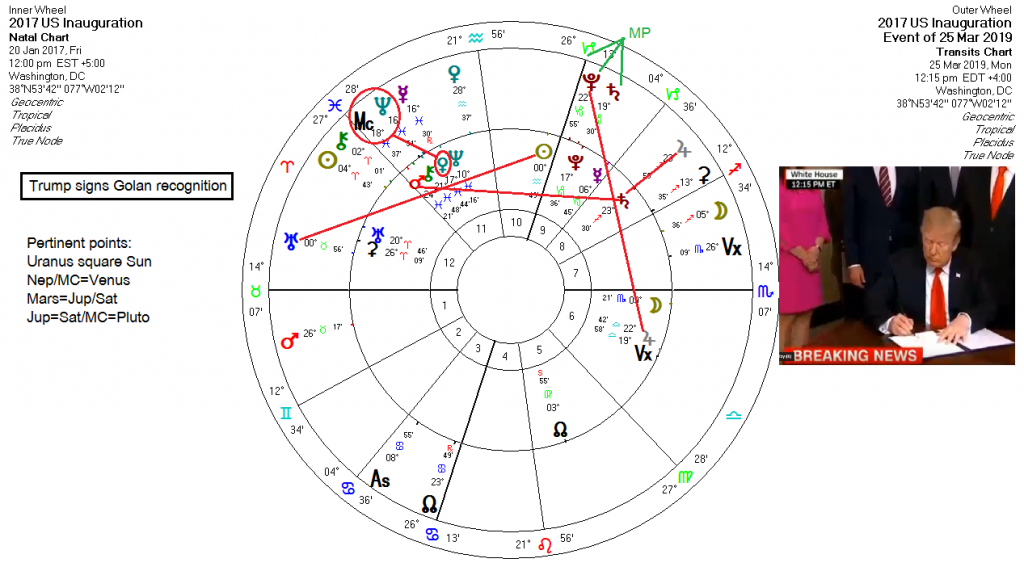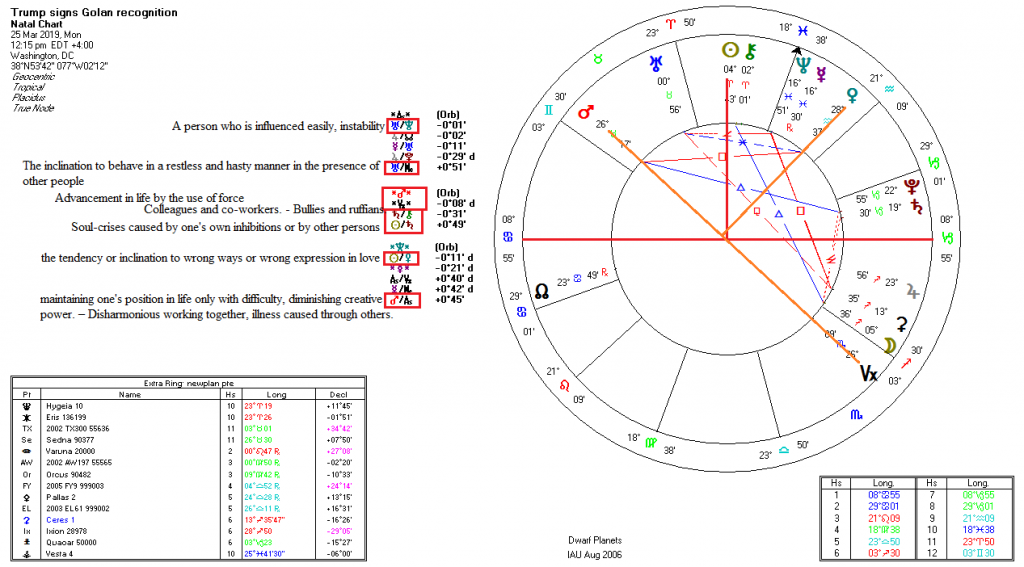This follows on from a previous post. In the morning of 25 Mar 19 a missile was launched from Gaza and landed on a private home in the Moshav Mishmeret in Israel (chart). The Israelis claimed that Hamas had ordered the attack and responded with force, bombing sites in Gaza in retaliation. Hamas claimed the launch was a mistake, the result maybe of a lightning strike or some such. Regardless, the Israeli response as usual was to launch air strikes against the suspected site of the launch and other strategic targets.
Later in the day Egypt brokered a ceasefire between Gaza and Israel, which was broken by Israel a few hours later. Bibi Netanyahu was in Washington at the time, about to attend the annual AIPAC conference, but cut his trip short as a result of the missile strike. While he was in DC, though, he attended the recognition of the Golan Heights as Israeli territory by Trump, which is against international law. But Bibi is in trouble at home, and the missile strike was perhaps a sign of things to come, as well as a message to Trump and Netanyahu.
The tide is quickly turning against the strategic interests of the US and Israel in the Middle East. That also includes the interests of Saudi Arabia in particular and other allied Arab states. The reasons for saying so are as follows, as evidenced by recent events:
- Syria and Iraq have all but reopened a highway between the two states due to the last remaining Daesh pocket being cleared in east of the Euphrates, which will allow Iranian transport freely into Syria. A new highway connecting Iran directly to Syria is under construction.
- The same highway, mentioned, will also connect Beirut with Syria, Iraq and Iran, thus strengthening Hezbollah.
- Iraq and Iran are increasing trade ties, ignoring threats of US sanctions and pressures
- Russian and Syrian Arab Army (SAA) forces are slowly beginning to attack the terrorist enclave in Idlib, which will cause an influx of the same into Turkey. The ceasefire agreement that was brokered between Turkey and Russia is falling apart and Turkey now finds its position there progressively weakening, as it does also in the northeast of Syria.
- Trump wants out of Syria, but is held back from doing so by factions in Washington, Riyadh and Tel Aviv who want to keep the conflict ongoing.
- Efforts at creating a united front against Iran, like we saw at the recent conference in Warsaw, have fallen on deaf ears.
- The Kurds in northeastern Syria are increasingly finding themselves in a precarious position, caught between Damascus and Turkey, with rapidly diminishing support from the US, even though they are still being supplied with weapons by the US.
- Turkey in increasingly turning to the East, away from Washington, seeing the decaying US influence in the Middle East and its floundering policies as more of a problem than a help.
- China’s interest in its B&R Initiative is increasingly being realized, and when the highway, mentioned previously, is completed, it will provide an essential link in that initiative, against Washington’s interests – a sort of Iranian-Syrian Silk Road. Syria is also seen as an essential link in China’s plans.
- Increasing sanctions on Iran, which point toward escalation, maybe to be realized as a hot escalation before the next US election in 2020. Trump was told when he took office that he would be a wartime president.
US strategic policy in the Middle East has been compared to:
“A dinosaur with a bird’s brain”. This is how the ex-President of Iran Hashemi Rafsanjani described the United States of America, evoking its great military strength but lack of strategic intelligence in foreign policy.”
He is not alone in his opinion. Such sentiments would indeed appear to be the case, though. If one steps back and looks at what has happened in the last four years since the Russian intervention in Syria, the strategic situation for Israel and for US interests there has gone from bad to worse. In reality, the invasion of Iraq in 2003 was the defining moment, the one that ensured growing Iranian influence in the region and increasing resistance against US policy and Israeli interests. This brings us back to the most recent missile and air strikes between Gaza and Israel.
The reaction of Israel to the most recent missile strike has been over the top. According to Elijah Magnier, a veteran Middle East journalist:
If one missile launched against Tel Aviv is doing all this reaction and Netanyahu is interrupting his visit [to Washington], what can happen if 10,000 missiles are launched during a war against Hezbollah?
He goes on to conjecture what the latest incident might mean for Netanyahu:
If @netanyahu doesn’t attack #Gaza he will lose the elections & shows #Israel’s weak retaliation power.
If he attacks and engages in a long war, #Gaza will retaliate and will bring him down.
If he limits himself to a small battle, results R uncertained.
He is probably correct. So far it has resulted in a small battle. Much regarding Netanyahu and Israel by consequence will depend on how the present situation is handled. The elections in Israel are in a few short days. This will either make or break Netanyahu. But the people of Gaza have little to lose by escalating tensions. Their infrastructure has largely been destroyed and they are in a dire situation, both from the standpoint of living standards and security. People are never more dangerous than when they have nothing left to lose.
From the start of this article, the conjecture is that the latest missile strike is a shot across the bow, a test of the waters. There are other militant factions in Gaza aside from Hamas, so to blame the missile strike on Hamas is both premature and convenient. One of those other groups could have launched the missile. And the fact that it was not shot down points to a weakness in Israeli air defenses. The fact that the missile strike occurred on the very day that Trump was to officially recognize the Golan as Israeli territory is probably not a coincidence, either. Trump recognized the Golan for two reasons, bigly:
- To help push Netanyahu over the line in the elections, and lesser-known;
- To make it more difficult for Syria to reclaim the Golan. Why he would want to do so is related to oil interests, namely Genie Energy, which wants to drill for oil in the Golan. It is against international law to take resources from occupied territory, and it is hoped that by recognizing the Golan, it will clear the way for oil exploration there.
Trump had powerful financial interests pushing him to recognize the Heights. Here is a shortlist of the advisory board of directors for Genie Energy: Baron Jacob Rothschild, Rupert Murdoch, Dick Cheney, Lawrence Summers, James Woolsey, Mary Landrieu and Bill Richardson, to name a few. It was a terrible policy decision, which has further angered many of the Arab states. It was also aimed at domestic politics. Trump is aiming for re-election in 2020. His campaign platform will be on two fronts: anti-socialism and pro-Israel, both of which put the Democrats in a bad light in the minds of many in the American public, and this along with the Mueller investigation now having shown that the Russian collusion story was a false narrative, aimed at de-throning Trump. Trump has probably just had his re-election assured, barring other unforeseen circumstances. But what effects will this move have in the Middle East? And why was it a terrible policy decision, especially over the long term?
Speaking after the declaration and in response to it, Mahmoud Abbas had this to say, which sums up the evolving situation:
“There will be no compromise on Jerusalem or any other Arab territory. The American administration’s policy will only increase tension and instability and will not achieve peace and security for anyone.”
This decision, along with the move of the US embassy to Jerusalem, is only serving to harden the resistance front in the Middle East to US/Israeli policies. Such hardening usually has an ultimate outcome – open conflict – unless more moderating forces can successfully be employed to counteract them. There seems to be little of the latter at present. The decision to recognize the Golan was poorly thought out and without a view to the long range consequences, instead playing to domestic politics in the US and Israel, as well as to moneyed interests. This is clearly shown in the two charts for the event (signing), one for the transits to the Trump administration and the other for the event itself. Keep in mind in looking at these charts that the results would be the same regardless of who was in office at the time. The chart for the transits is below (bigger):

At the time of the signing Uranus was transiting square the administration Sun, showing the independent nature of the event and the willingness to go it alone, in defiance of the international community. The Midheaven of the event was conjunct Neptune, with the admin Venus at the midpoint: “The feigning or pretending of particular feelings, the simulation of love. – An apparent show of attachment. – The art of acting [as in feigning].” Transiting Pluto is square the admin Jupiter, showing the desire to exert power and the plutocrats behind the decision. But there is a midpoint structure formed by the current transits, with the following: Pluto=Saturn/Midheaven. That midpoint setup shows a ‘fateful struggle’, or a ‘struggle ordained by destiny’. It otherwise points to success, if it comes, but attained only through great difficulties. And it points to the foreign influence involved in the decision (Israel and foreign banking interests), re: the 9th house.
Transiting Jupiter is on the admin Saturn, which otherwise points to patient pursuit of long-term objectives. However, it also over-activates the natal Mars/Saturn square, thus marking this as a fatal mistake or major blunder, taking all the other factors into account. This can be read several ways, according to the point of view, but the results turn out the same with the other factors. Firstly, it can show “the desire to enforce a change of circumstances and conditions in life, the act of separation.” Secondly, it can show , “The complete concentration of energy upon a particular objective to the entire exclusion of other interests, the ability to render quick work (satisfactorily). – The ability to destroy or eliminate something thoroughly.” Thirdly, “the tendency to let good opportunities slip away. – The termination of a relationship, a difficult birth.”
And the event itself shows very similar effects. The interpretations of the midpoints are shown on the chart, below (bigger):

There is one caveat with what is shown. The Mars/Vertex shows the interpretation for Mars/Ascendant. But the Vertex shows other realities. That other reality in this case probably points to the idea behind the scenes that this act will provoke a showdown of some sort, which it might do, and probably certainly will in coming years. The world at large recognizes the Golan as Syrian territory. And no US President or Congress has the authority to unilaterally declare it to be Israeli territory. The next President who comes along could also revoke what Trump has done, albeit doubtful. But it is possible. The Syrians cannot retake the Golan militarily at the moment, but the resistance forces in the region can certainly make life very difficult for the occupiers in the meantime. Given all the other bullet points listed at the start, life in the region is going to become quite unsettled in the months and years to come. Trump might be feeling emboldened now that the Mueller report has exonerated him from collusion, but his troubles are far from over, and his relationship with Israel is only hastening what looks to be a serious military situation in the Middle East. But that can also point to regime change in Israel, too, if things go badly wrong.
Featured pic from Haaretz

